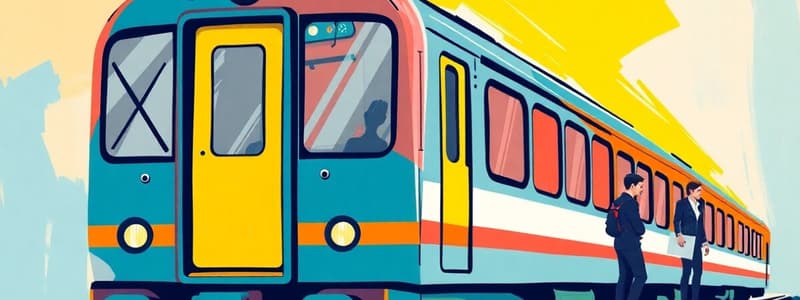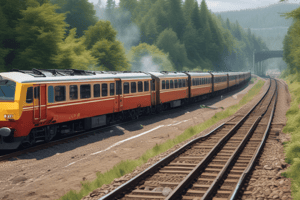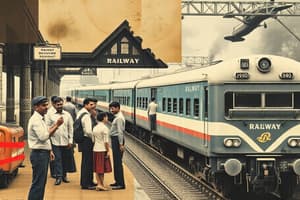Podcast
Questions and Answers
What is the first stage in the railway recruitment process?
What is the first stage in the railway recruitment process?
- Application (correct)
- Medical Examinations
- Interviews
- Screening
Which of the following traits are often assessed for suitability in railway jobs?
Which of the following traits are often assessed for suitability in railway jobs?
- Academic qualifications exclusively
- Physical strength only
- Only problem-solving skills
- Teamwork and communication skills (correct)
Which stage assesses candidates' physical strength and overall health?
Which stage assesses candidates' physical strength and overall health?
- Medical Examinations (correct)
- Final Selection
- Preliminary Tests
- Skill Assessments
What do preliminary tests typically assess?
What do preliminary tests typically assess?
What is an important factor for candidates to consider when applying for railway jobs?
What is an important factor for candidates to consider when applying for railway jobs?
Which role requires a focus on technical skills during the assessment process?
Which role requires a focus on technical skills during the assessment process?
What type of roles requires adequate physical preparation?
What type of roles requires adequate physical preparation?
Which of the following describes a challenge candidates may face during the recruitment process?
Which of the following describes a challenge candidates may face during the recruitment process?
What may railway organizations consider in the recruitment process?
What may railway organizations consider in the recruitment process?
Which statement accurately reflects the recruitment process?
Which statement accurately reflects the recruitment process?
Which statement about the railway recruitment process is true?
Which statement about the railway recruitment process is true?
What is a necessary skill for candidates to handle recruitment stress and anxiety?
What is a necessary skill for candidates to handle recruitment stress and anxiety?
What is a crucial aspect evaluated during the selection interviews?
What is a crucial aspect evaluated during the selection interviews?
Which type of role involves maintaining railway infrastructure?
Which type of role involves maintaining railway infrastructure?
Which type of qualifications is generally required in railway recruitment?
Which type of qualifications is generally required in railway recruitment?
What must candidates do to stand out in a competitive recruitment process?
What must candidates do to stand out in a competitive recruitment process?
Flashcards
Railway Recruitment
Railway Recruitment
A multi-step process used by railway organizations to select candidates for various roles, from entry-level to management.
Application Stage
Application Stage
The initial step where candidates submit their applications online or through designated channels, providing details of their qualifications and experience.
Screening Stage
Screening Stage
A process where applications are reviewed to eliminate unqualified candidates, ensuring applicants meet minimum requirements.
Preliminary Tests
Preliminary Tests
Signup and view all the flashcards
Skill Assessments
Skill Assessments
Signup and view all the flashcards
Medical Examinations
Medical Examinations
Signup and view all the flashcards
Interviews
Interviews
Signup and view all the flashcards
Final Selection
Final Selection
Signup and view all the flashcards
Physical Fitness in Railway Jobs
Physical Fitness in Railway Jobs
Signup and view all the flashcards
Personality and Behavioural Traits Evaluated
Personality and Behavioural Traits Evaluated
Signup and view all the flashcards
Thorough Preparation for Railway Recruitment
Thorough Preparation for Railway Recruitment
Signup and view all the flashcards
Researching Railway Recruitment Procedures
Researching Railway Recruitment Procedures
Signup and view all the flashcards
Time Management in Railway Recruitment
Time Management in Railway Recruitment
Signup and view all the flashcards
Competition in Railway Recruitment
Competition in Railway Recruitment
Signup and view all the flashcards
Rigorous Requirements in Railway Recruitment
Rigorous Requirements in Railway Recruitment
Signup and view all the flashcards
Mental Preparedness for Railway Recruitment
Mental Preparedness for Railway Recruitment
Signup and view all the flashcards
Study Notes
Overview of Railway Recruitment
- Railway recruitment is a multi-stage process for various roles, from entry-level to management.
- Key stages include application, screening, preliminary tests, skill assessments, and interviews.
- Specific recruitment guidelines and criteria vary by railway organization.
- Roles require differing qualifications and experience based on the job requirements.
- Emphasis is on technical skills, physical ability, and mental aptitude.
- Competition is common; thorough preparation is essential.
Recruitment Process Stages
- Application: Candidates apply through official websites or designated channels, providing personal details, qualifications, and experience.
- Screening: Applications are reviewed to filter out unqualified candidates, ensuring minimum requirements are met.
- Preliminary Tests: Assess basic math, reasoning, and general awareness related to the position.
- Skill Assessments: Tailored to roles (e.g., aptitude tests, practical demonstrations for technical positions).
- Medical Examinations: Physical and medical fitness tests are mandatory, evaluating strength, vision, hearing, and overall health.
- Interviews: Technical or behavioral interviews assess suitability for the role and overall personality.
- Final Selection: Successful candidates are chosen for the position.
Essential Qualifications and Requirements
- Educational Qualifications: Specific degrees, diplomas, or certifications are needed, varying by job.
- Experience: Some roles require relevant experience (internships, prior work, voluntary work).
- Technical Skills: Technical or engineering roles are assessed for technical skills and knowledge, typically via specific tests.
- Tests can evaluate software proficiency, technical knowledge, and practical application of skills.
- Physical Fitness: Certain roles (operations, maintenance) require physical fitness and stamina.
- Personality and Behavioural Traits: Candidates are evaluated for teamwork, communication, problem-solving, and adaptability.
Important Considerations for Candidates
- Thorough Preparation: Understanding specific requirements and expectations for each stage is critical. Prepare for various tests and study key materials.
- Research: Investigate the specific recruitment procedures and criteria of the chosen organization.
- Time Management: The application and selection process is time-consuming; effective time management is essential.
- Physical Fitness: Adequate preparation is necessary for roles involving physical tasks.
- Mental Preparedness: Manage stress and anxiety to perform at your best throughout the process.
Types of Railway Jobs
- Operational Roles: Train drivers, conductors, signal controllers, station staff.
- Maintenance Roles: Mechanical, electrical, civil, and track engineers for infrastructure maintenance.
- Administrative Roles: Clerical, management positions, needing specific qualifications and experience based on the level.
- Technical Roles: Engineering positions in mechanical, electrical, and civil fields.
- Security Roles: Positions in security departments.
Potential Challenges in the Recruitment Process
- Competition: High competition makes it challenging to stand out.
- Rigorous Requirements: Railway organizations often have high standards and demands.
- Time Commitment: Significant time and effort are required, needing effective planning.
- Physical and Mental Strain: Tests and interviews can be physically and mentally demanding.
Studying That Suits You
Use AI to generate personalized quizzes and flashcards to suit your learning preferences.



